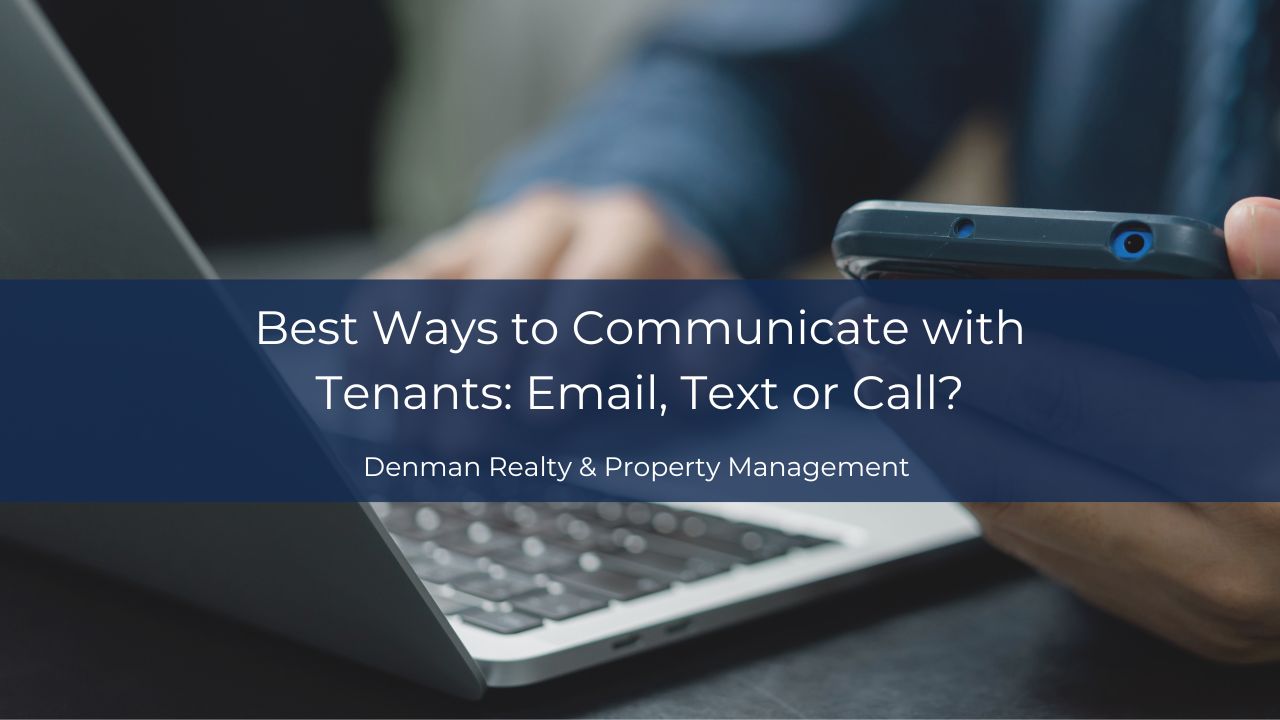Key Takeaways
- Match the Method to the Message - Use email for formal and non-urgent matters, text for quick updates or reminders, and phone calls for urgent or sensitive issues. Choosing the right communication channel helps ensure clarity, professionalism, and timely responses.
- Respect Tenant Preferences - Every tenant has a preferred way of communicating. Asking about and honoring these preferences early—such as during lease signing—builds trust and minimizes misunderstandings, contributing to a stronger landlord-tenant relationship.
- Combine Methods When Appropriate - A blended approach often works best—for example, confirming a phone call with a follow-up email. Being clear, consistent, and professional across all channels leads to more effective communication and better property management overall.
Whether it’s about rent payments, maintenance issues, or lease updates, the way landlords reach out to tenants matters. Poor communication can lead to misunderstandings, late responses, or even legal trouble. That is why choosing the right method of communication is not just a preference, but a necessary part of managing rental properties.
Many landlords struggle to decide whether email, text, or phone calls are best when talking to tenants. Each method has pros and cons depending on the situation, urgency, and tenant preferences. To help landlords make better decisions, Denman Realty & Property Management put together this article to outline when and how to use each communication method effectively.

Email: For Formal and Non-Urgent Matters
Email is a reliable and professional method of communication. It’s ideal for situations where you need to send detailed information or have a written record. Emails can be referred back to if there is ever a dispute or confusion about what was said.
Common uses for email include lease agreements, notices of rent increases, rule updates, or written warnings. Since email is not usually checked as quickly as texts or calls, it should not be used for urgent issues like emergency repairs or last-minute scheduling changes.
Emails allow landlords to create a detailed written record for both parties, use a professional tone and attach necessary documents. However they also come with slower response time. What’s more, some tenants may not check email regularly or they may end up in spam folders if not sent properly. To ensure successful email communication use a clear subject line, be direct and to the point, include dates and times when necessary, and keep language simple and respectful.
Text Message: For Quick, Casual Updates
Text messaging is a fast and efficient way to reach tenants. Most people check their phones several times a day, so text messages are usually read quickly. Texting is a good choice for short reminders, scheduling, or general check-ins.
Examples include property maintenance visit reminders, confirmation of rent received, or updates about weather-related service delays. It’s also useful for following up after a phone call or email to confirm receipt.

That said they aren’t ideal for formal or complex topics and can be seen as intrusive if sent too often or too late at night. As such landlords should keep texts short, avoid sending messages outside of business hours, not rely on text for important legal matters, and ask tenants if they are okay with receiving them.
Phone Call: For Urgent or Sensitive Matters
Phone calls are useful when the message is urgent or when a two-way conversation is needed. They are best for handling emergencies, discussing complex issues, or resolving conflicts. A call also adds a personal touch that can help build trust between the landlord and tenant.
Situations that may call for a phone conversation include water leaks, heating problems, neighbor complaints, or discussing payment plans. In some cases, a phone call followed by an email can help confirm what was said and avoid miscommunication.
Advantages of calling tenants include immediate, real-time conversation, quick resolution of issues, and personal and human interaction. There are, however, some disadvantages of this method of communication like having no automatic record of conversations and difficulty reaching tenant during work hours. For the best results landlords should schedule calls when possible, take notes during or right after the call, and follow up with an email summary.
Know Your Tenant's Preference
Not all tenants are the same. Some may prefer email, others might like texts, and some may feel most comfortable with calls. As a landlord, you should ask tenants early on what method of communication they prefer. This will help avoid confusion and improve cooperation.
![]()
Including a communication preference section in the lease agreement or during move-in paperwork is a smart way to handle this. Once you know their preference, try to stick to it whenever possible.
Also, respect your tenants' time. Avoid sending messages during late hours or on weekends unless it is an emergency. Being considerate improves your working relationship and reduces stress for both parties.
Use a Combination When Needed
Sometimes, using more than one method works best. For example, you might send an email with full details and then follow up with a quick text to let the tenant know it was sent. Or you could call to discuss something urgent and then send an email summary to confirm. Mixing methods based on the situation can make communication more effective. The key is to be consistent, clear, and professional no matter which tool you use.
Bottom Line
Whether you're a local or long-distance landlord, you need to ensure that you communicate effectively with tenants. Landlords have several options, and the best choice depends on the message, the urgency, and the tenant's preference. Using the right method at the right time improves tenant satisfaction and helps prevent problems.
Denman Realty & Property Management helps landlords manage communication with tenants in a professional and efficient way. We assist with sending important reminders and managing emergency calls and tenant inquires. Our team ensures your message gets across clearly and quickly, so you can focus on growing your rental business.
To learn more about how Denman Realty & Property Management can simplify your landlord responsibilities, contact us today. Let our experience and support help you build better relationships with your tenants and manage your property more effectively!



